Share post now

global
The Alliance Sud magazine analyses and comments on Switzerland's foreign and development policies. "global" is published four times a year (in german and french) and can be subscribed to free of charge.
Trade and climate
03.12.2024, Climate justice, Trade and investments
Imports of the most polluting products are to be taxed under the European Union's Carbon Border Adjustment Mechanism (CBAM). No exemption is being contemplated for the poorest countries, even though they will be severely affected. Should Switzerland ever adopt this measure, it would have to make sure to put this right.
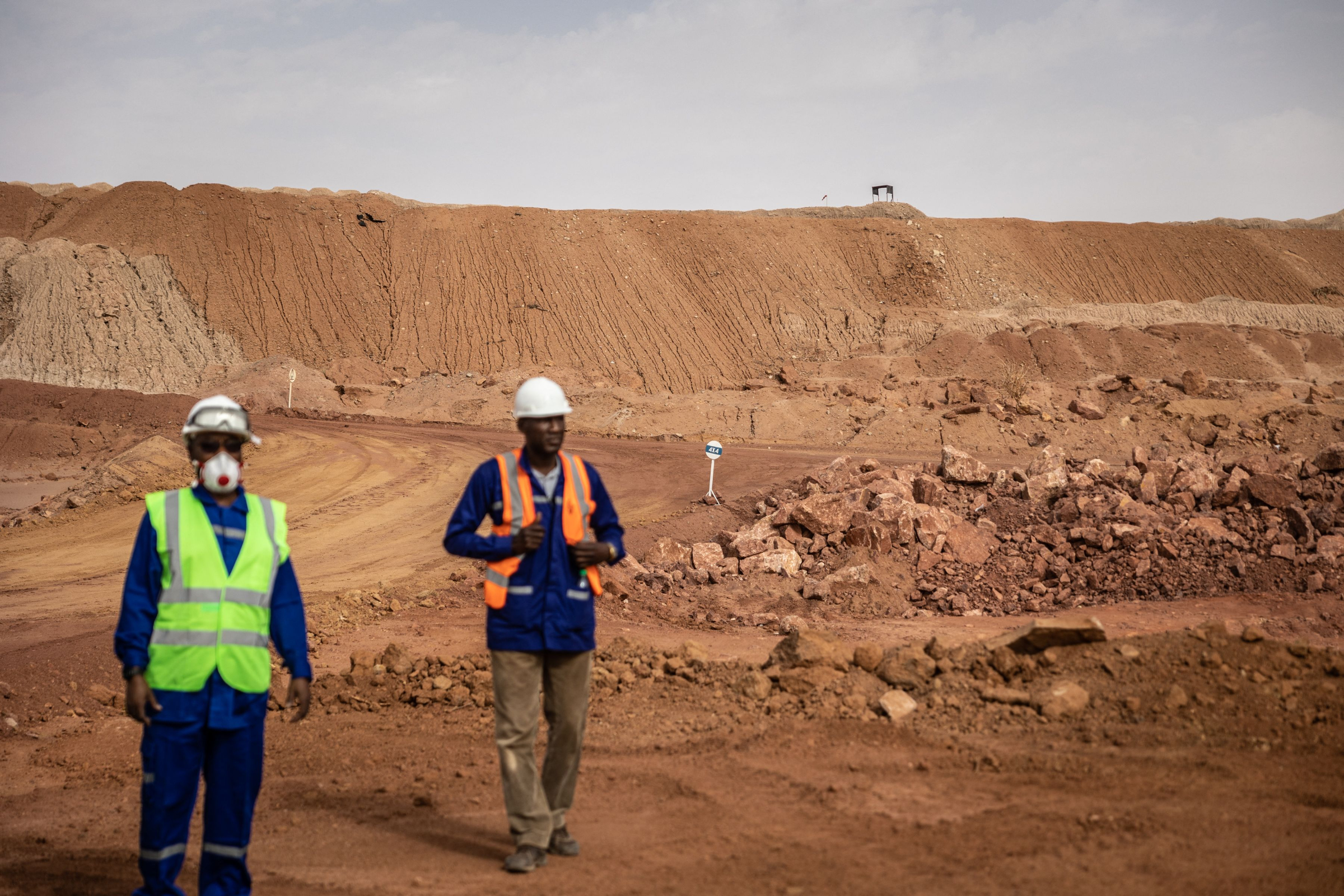
One of the world's largest uranium ore mines closed in Akokan, Niger. However, more are planned in the crisis-ridden north and are economically significant. © Keystone / AFP / Olympia de Maismont
The European Union (EU) takes its climate commitments seriously. In 2019, it launched the European Green Deal, designed to cut CO2 emissions by 55% by 2030 and achieve carbon neutrality by 2050. The programme encompasses a number of internal and external policy measures, including the European Union Deforestation Regulation (EUDR, see global #92). Another key European trade policy project is the CBAM, or Carbon Border Adjustment Mechanism. Its purpose is to make importing industries subject to the same rules as polluting European enterprises. The latter must observe a cap on emissions, which, by the way, they can trade on the "carbon market" in order to comply with the limits set. These measures are designed to render investment in clean energy in Europe cheaper and more attractive. "The CBAM will encourage global industry to adopt greener technologies," European Commissioner for Economic Affairs Paolo Gentiloni has said.
Brussels adopted the CBAM in order to prevent production from moving to countries where the price of carbon is lower than in the EU, or even zero (known as "carbon leakages"), or to shield European producers from unfair competition. Under this mechanism, imports of particularly polluting products will be taxed at the border, starting with iron and steel, cement, fertilisers, aluminium, hydrogen and electricity. It took effect in the EU on 1 October 2023 and is being implemented in successive phases; the mechanism will be fully deployed as of 2026. Starting in 2031, it is expected to cover all imports.
The fundamental question is whether the measure is effective. The EU is optimistic. It estimates that its emissions will decline by 13.8% by 2030, while those of the rest of the world will be down by 0.3% compared with 1990. But the approach elicits sharp criticism from the countries of the Global South, which assert that it is negatively impacting their development. Others criticise it for failing to provide a general waiver, at least for the poorest countries. Moreover, UN Trade and Development (UNCTAD) has calculated that the impact on climate is expected to be minimal: the CBAM will reduce global CO2 emissions by a mere 0.1%, while EU emissions will diminish by 0.9%. It is nonetheless expected to boost the revenue accruing to developed countries by USD 2.5 billion while reducing the revenue going to developing countries by USD 5.9 billion.
In 2022, ministers from Brazil, South Africa, India and China called for discriminatory measures such as carbon taxes at borders to be avoided. The countries most affected by this mechanism are the emerging countries that are the leading exporters of steel and aluminium to Europe, namely, Russia, Turkey, China, India, South Africa and the United Arab Emirates. But Least Developed Countries (LDCs, a category created by the United Nations) such as Mozambique (aluminium) and Niger (uranium ore) will also be impacted. The welfare losses to developing countries like Ukraine, Egypt, Mozambique and Turkey are put at EUR 1–5 billion, a substantial amount considering their gross domestic product (GDP).
Let us take Africa, which is home to 33 of the 46 LDCs. A recent study by the London School of Economics concludes that if the CBAM were applied to all imports, Africa's GDP would contract by 1.12% or EUR 25 billion. Aluminium exports would decline by 13.9%, iron and steel by 8.2%, fertilisers by 3.9%, and cement by 3.1%. So, should the baby be thrown out with the bathwater and the CBAM declared to be anti-development? Probably not. The Belgian NGO 11.11.11. proposes that the least developed countries be exempted from this mechanism, at least initially, under WTO rules; or that they be taxed less than the others. When the CBAM was being discussed in Brussels, this possibility was considered then jettisoned by the Parliament, as the EU opted to secure more revenue. UN Trade and Development suggests returning the revenue from the mechanism to the LDCs to fund their climate transition. The EU is expected to garner revenue of EUR 2.1 billion, which could be channelled multilaterally via the Green Climate Fund, itself currently underfunded.
For now, there is nothing of the kind in Switzerland. Goods originating in Switzerland and exported to the EU are currently exempt from the CBAM by virtue of the Emissions Trading System (ETS), and the Federal Council has opted not to introduce any such mechanism for products being imported into Switzerland. The ETS represents the maximum amount of emissions available to industries in a particular economic sector. Each participant is allocated a certain quantity of emission rights. If their emissions remain below this limit, they may sell their rights. If they exceed the limit, they may purchase rights.
A parliamentary initiative was submitted to the National Council in March 2021 calling on Switzerland to amend the CO2 Act to include a border carbon adjustment mechanism, taking account of developments in the EU. Currently, that parliamentary initiative is still being discussed in the committees. The CBAM could be an effective trade measure for reducing imported CO2 emissions. But should Switzerland ever adopt it, it would have to make sure not to penalise the poorest countries, instead granting them exemptions, and returning a substantial part of the accrued revenue to assist them in making the energy transition.
International trade accounts for 27% of emissions
Greenhouse gas emissions generated by the production and transport of exported and imported goods and services account for 27% of global greenhouse gas emissions. According to the OECD, these emissions come from seven economic sectors, namely, mining and energy production, textiles and leather, non-metallic chemicals and mining products, base metals, electronic and electrical products, machinery, vehicles and semiconductors.
Action is undoubtedly needed on both the trade and production fronts – on the production front, for example, by promoting green technologies, technology transfer and climate finance. On the trade side, through other measures such as the CBAM, though without penalising poor countries. The latter must be assisted in managing their ecological transition and adapting to the new standards.
Share post now

global
The Alliance Sud magazine analyses and comments on Switzerland's foreign and development policies. "global" is published four times a year (in german and french) and can be subscribed to free of charge.
EU deforestation regulation
21.06.2024, Trade and investments
A new regulation prohibits the import into the EU of the seven products most linked to deforestation. There must be no harm to small producers in the South.
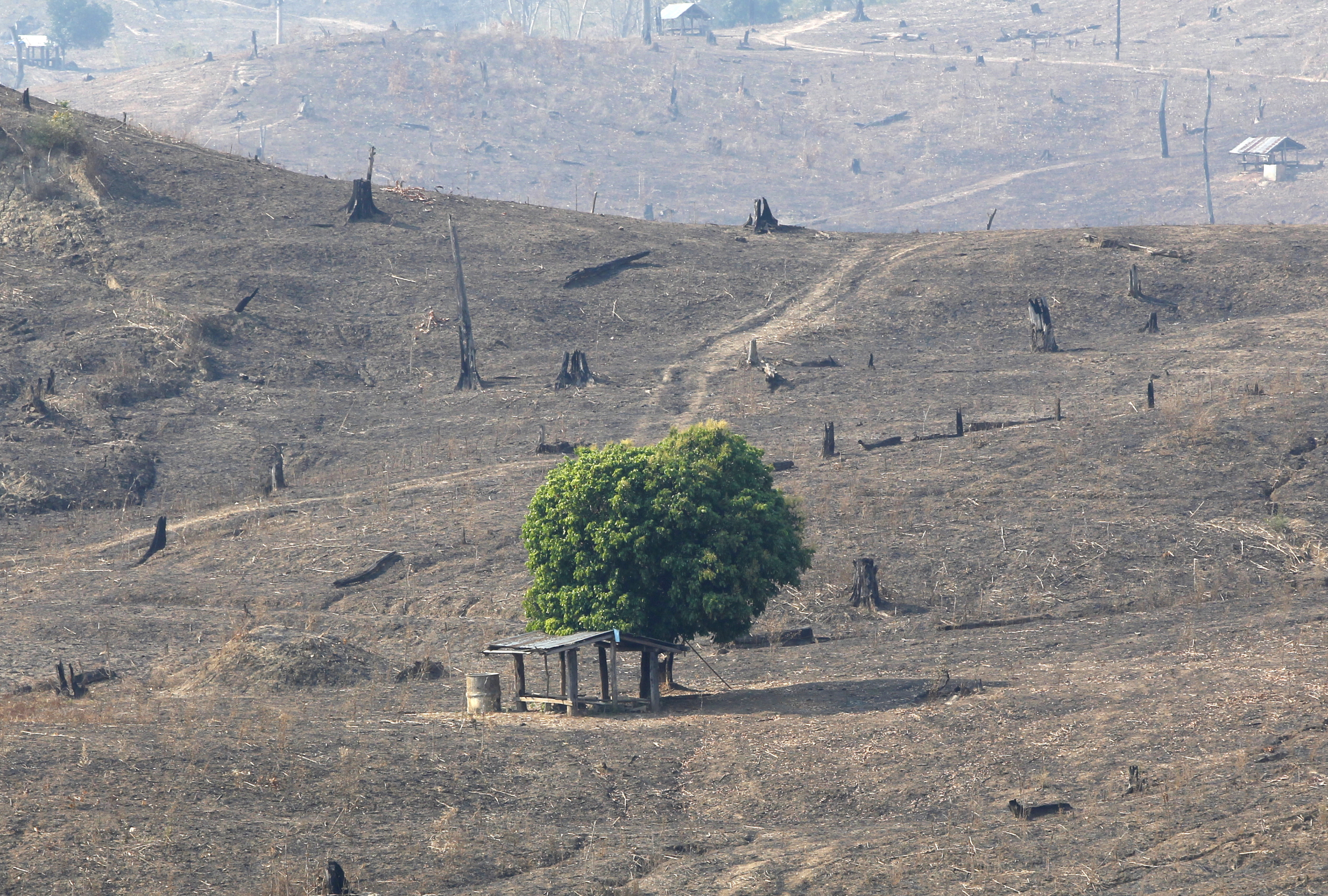
A single green tree in the burnt and deforested landscape near Mae Chaem, northern Thailand.
© Keystone / EPA / Barbara Walton
The new European Union Deforestation Regulation (EUDR) will take full effect on 1 January 2025. Imports into the European Union (EU) of the seven commodities that contribute most to the death of forests – cocoa, coffee, palm oil, rubber, soya, wood, cattle – and their derived products such as chocolate, coffee capsules, furniture, paper, tyres, for example, will only be allowed if it is demonstrated that they originate from land that was not deforested after 1 January 2020. They must also respect labour rights, anti-corruption standards and the rights of indigenous peoples, among other things.
For those purposes, producing countries will be divided into three categories based on the risk of deforestation, and production sites will be monitored by sophisticated technology, including geo-tracking. The initiative forms part of the EU Green Deal, which is based on an incontrovertible finding: after China, the Twenty-seven are the main importers of products that contribute to the deforestation linked to international trade. Due diligence, i. e., ensuring the absence of deforestation, must be carried out by all players in the supply chain – producers, exporters and importers large and small, with more or less stringent conditionalities, depending on size.
The NGO Fern (Forests and the European Union Resource Network) takes the view that the regulation could also affect Honduras, Ghana and Cameroon, which are countries especially dependent on exports to the EU.
The countries of the Global South are steadfastly opposed to this initiative, which they view as disguised protectionism and a new green colonialism. In September 2023, 17 Heads of Government of Latin America, Africa and Asia sent a letter to the Presidents of the European Commission, European Parliament and Council of Ministers deploring the "one-size-fits-all" approach of the EUDR and the fact that it ignores the different local conditions.
Smallholders and small-scale producers, in particular, will find it extremely difficult to prove their compliance with the requirements, even though, except for a few products like coffee and cocoa, it is mainly the large producers and exporters who are able to place their products on European markets.
The negative impacts of this initiative were not long in coming. As highlighted by the International Institute for Environment and Development, European importers are already turning away from Ethiopian coffee and instead towards Brazilian coffee, which is much more traceable.
In its Trade and Development Report 2023, UN Trade and Development (formerly UNCTAD) expressed concern over the proliferation of unilateral initiatives like the EUDR and the Carbon Border Adjustment Mechanism (CBAM) – the carbon tax at the border also imposed by the EU on highly polluting products such as aluminium. They are seen as violating the principle of common but differentiated responsibilities enshrined in the Paris Climate Agreement.
Krungsri Research View looked specifically at the case of Thailand, which demonstrates the ambivalent nature of the impact of the EUDR. The products covered by the EUDR represent a mere 8.3 per cent of exports to the EU and 0.7 per cent of all Thai exports, but their value is rising.
Producers and exporters of rubber, wood and palm oil will have to bear substantial costs in adapting to the new regulation; small producers will lose their competitiveness and Thailand risks finding itself excluded from world supply chains.
But if the process is adequately supported, both by the government and through the aid available under the EUDR, Thailand could gain a competitive advantage over its competitors while conserving its forests.
And what about Switzerland? The country is being indirectly affected by the new provision, as all exports of the seven products to the EU must meet EUDR requirements. Krungsri also states that our country even ranks 17th in terms of impact, with regard to cocoa and especially coffee.
So far, the Swiss government has decided not to adapt Swiss law to the EUDR for as long as mutual recognition with the EU is not possible. This is meant to avoid doubling the administrative burden on Swiss companies. But it plans to conduct an impact study by the summer and to take a decision thereafter.
Civil society is examining the matter. Alliance Sud participates in a working group that is studying whether and how to adapt the EUDR to Switzerland. The concern is to avoid penalising small producers in countries of the Global South. Where necessary, support and training measures should be put in place, and local communities consulted. This would ensure that the fight against climate change does not prejudice the potential for further developing international trade.
Share post now

global
The Alliance Sud magazine analyses and comments on Switzerland's foreign and development policies. "global" is published four times a year (in german and french) and can be subscribed to free of charge.
Economic history
25.03.2024, Trade and investments
Eighty years ago, 43 countries met in the US resort town of Bretton Woods and laid the groundwork for the International Monetary Fund and the World Bank. The entire post-war order is often exaggeratedly ascribed to that conference. A recently published book puts things in perspective.
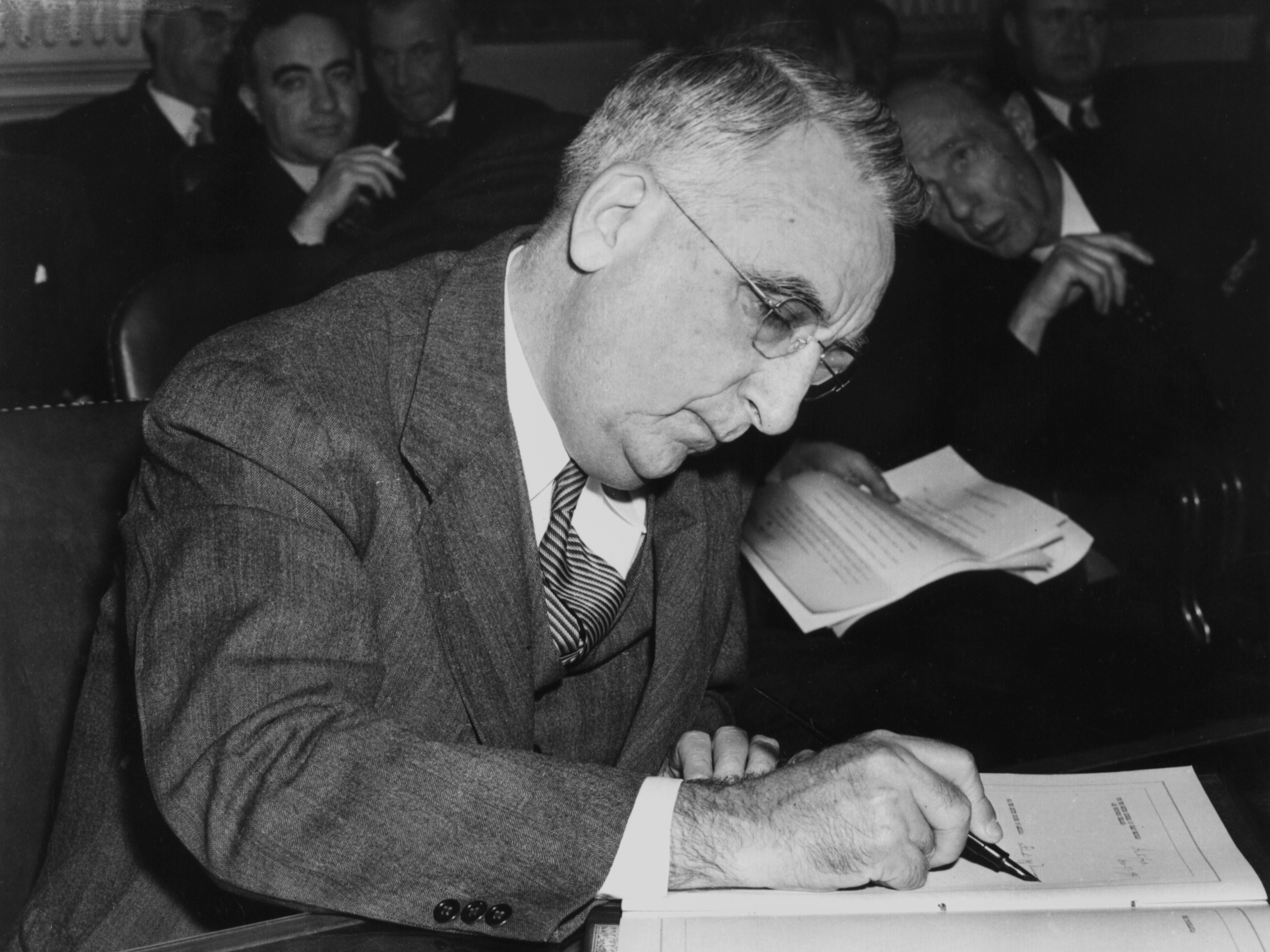
Fred M. Vinson, US Secretary of the Treasury, signs the Bretton Woods agreements in Washington, USA,
on 27 December 1947. © KEYSTONE / DPA DC /STR
Whenever the global economy shows signs of strains and stresses, the call for a "kind of Bretton Woods akin to what followed the Second World War" is never far away, said Klaus Schwab in the wake of the coronavirus crisis. A recently published book by economic historian Martin Daunton titled "The Economic Government of the World, 1933-2033", helps put the import of the Bretton Woods Conference in perspective.
The author shows that what 1944 represented was not the design of a coherent structure that merely needed to be implemented after the war so as to kick-start the post-war economic miracle. What instead occurred at the time was merely the launch of a quest. The post-war order was also shaped by altogether different forces, such as the Cold War (at Bretton Woods, the Soviet Union was still being envisaged as a fully-fledged partner), the related Marshall Plan, and the restoration of Germany's economic position in Europe, itself no less related. The system of currencies flexibly pegged to the dollar, itself in turn convertible to gold at a fixed exchange rate, functioned as envisaged at Bretton Woods only from 1958 to 1968.
There was a faction within the US Administration under Franklin D. Roosevelt, the Democrat President from 1933 to 1945, that also thought of the New Deal in international terms. Already in the early 1940s, it drew up plans for a public Inter-American Development Bank meant to undercut the power of Wall Street bankers and favour long-term public development funding rather than private investment. In 1940, the officer with competence for Latin America at the US State Department said that this would usher in a system where finance would serve trade and development (...) in direct contrast to the earlier system, which was based on the notion that development and trade should serve finance. Resistance from Wall Street and in Congress did temporarily scuttle these plans, but the matter had become a topic in its own right, thanks to the discussion around an "International Bank for Reconstruction and Development" (IBRD, still the official name of the World Bank today) in Bretton Woods.
The Bretton Woods Conference was dominated by the USA and Great Britain, and substantial elements of it had been negotiated beforehand. But countries of the Global South were also represented – provided they were already independent (such as in Latin America) or semi-autonomous (such as India). Still completely dependent on commodity exports at the time, Australia, too, shared the same concerns. The conference on the monetary and financial order was not, however, the only forum in which to address their priorities. Already in 1943, a conference had been held on food and agriculture, followed by one on labour a year later, where Australia attempted in vain to establish full employment as pillar of the post-war order on a par with the monetary and trade aspects.
"The Economic Government of the World, 1933-1923" (published by Farrar, Straus and Giroux, November 2023, 986 pages) takes you behind the scenes of the institutions that have shaped the global economy over the last ninety years.
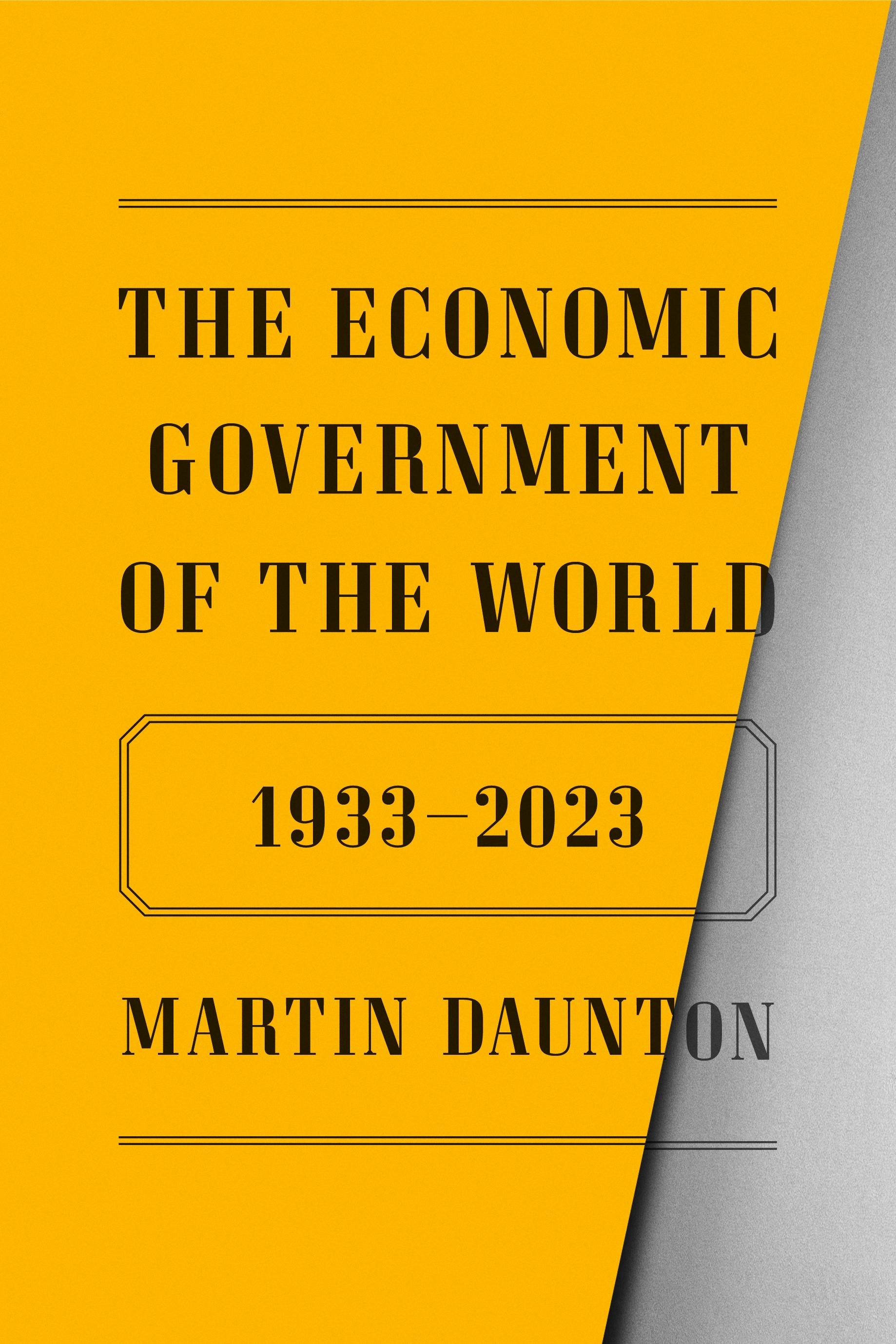
The USA and the UK had already agreed on the core elements of the International Monetary Fund, whereby members could peg their currencies to the dollar, which in turn would be convertible to gold at a fixed rate. The underlying idea was to combine stability and flexibility in the monetary system so as to enable countries with trade deficits to devalue their currencies in a controlled manner, thereby avoiding austerity and unemployment. This went hand-in-hand with capital controls designed to shield countries from destabilising capital flows. The US chief negotiator at Bretton Woods, Harry Dexter White (his British counterpart was the economist John Maynard Keynes, to whose economic philosophy – Keynesianism – the entire post-war order would later be attributed), wrote in an early draft of the monetary order that countries should prevent capital flows that served to help the rich avoid "new taxes or social charges".
The USA and the UK also proposed a decision-making model that was linked to the monies paid into the fund, based on the principle of "one dollar, one vote". This conferred disproportionate influence on the UK and veto power on the USA. China and India, backed by Australia, the Latin American countries and France, protested in vain against this. To this day, the quota issue – now rendered all the more urgent by the altered balance of economic power across the global economy – remains unresolved.
There were 19 Latin American delegations at Bretton Woods. Their spokespersons underlined the specific trade balance-related problems affecting countries that were dependent on commodity exports. Their primary concern was not with currency matters but instead with the sharply fluctuating prices of mineral and agricultural raw materials. These countries therefore tried to add development issues to the mandate of the International Monetary Fund (IMF): they called for commodity agreements to stabilise prices and for leeway to promote and protect their own industries so as to reduce their dependence on imports. Their efforts were largely unsuccessful, and while the "Articles of Agreement" of the IMF do contain a commitment to development, implementation is left up to the IBRD, that is to say, the World Bank.
The invitation to the Bretton Woods Conference clearly prioritised the monetary fund – for which "definite proposals" were to be formulated – over a bank for reconstruction. For the delegations from the Global South, however, key aspects of the discussion on the IBRD were of great relevance. One centred on whether the bank should primarily guarantee private investments or grant loans independently. The UK and the representatives of Wall Street wanted a bank that would primarily coordinate and secure private transactions. That was not surprising, as the UK was still the leading financial centre – 70 per cent of global financial transactions were taking place in sterling even after the war – before Wall Street overtook the City of London. A second question revolved around the matter of "reconstruction" versus "development" in the Bank's mandate. Lastly, there was the related matter of whether the Bank would be able to grant loans that yielded no direct economic return, such as for structural sewerage or health programmes that boost a country's long-term productivity, or strictly for specific projects that are also of commercial interest – a power plant for example. Anyone following the current discussions regarding the World Bank would be hard put not to utter a "sounds familiar" – even 80 years on.
The upshot was a compromise that placed reconstruction and development of IBRD members on an equal footing. There was not much flexibility on the other issues, however. Just 20 per cent of the capital could be granted directly as loans (the remainder was earmarked for securing private investments) and indeed – barring (unspecified) exceptional cases – only for specific projects with a "productive purpose".
While the discussion and decision-making revolved only around the Monetary Fund and the World Bank in 1944, thought had nonetheless been given from the onset to an international trade organisation as the third pillar of the global economic order. Here too, the aim was to prevent conditions like those that prevailed during the interwar period, when countries erected high protective tariff walls and engaged in trade wars (Daunton prefaces his book with a quote from Donald Trump: "Trade wars are easy to win").
After the disillusionment of Bretton Woods, and now reinforced by an independent Indian subcontinent, the countries of the Global South placed their hopes in the negotiations on the International Trade Organisation (ITO). These talks took place in Geneva in 1947 and in Havana in 1948. The non-industrialised "developing countries" made up a majority at the Havana Conference. That meeting was overshadowed by the Marshall Plan, and many countries of the Global South were hoping or expecting to benefit from aid on the same terms. It nevertheless became increasingly apparent to them that this would not be the case (even though the official USA refusal came only after the conference). Spearheaded by the countries of Latin America and by India, the "developing countries" used their majority at the Havana Conference to make the ITO Charter more rigorous by incorporating the demands they had failed to obtain at Bretton Woods: restricting free trade so as to build up their own industries, preferential tariffs and commodity agreements. Furthermore, the ITO was to operate by the principle of "one country, one vote".

Martin Daunton is Emeritus Professor of Economic History at the University of Cambridge. He is currently a visiting professor at Gresham College in London.
This all came to nothing when US President Truman decided, in December 1950, not to submit the agreement to Congress. Most other industrialised countries had made their approval contingent on that of the USA, with the result that the ITO died a quiet death in the early 1950s. What remained was the General Agreement on Tariffs and Trade (GATT), which had already been negotiated in 1947 and provided for gradual tariff reductions. It was only in 1994, with the founding of World Trade Organization (WTO) in an entirely different context and after seven years of negotiation, that the architecture was completed as originally planned.
The post-war economic order was termed "embedded liberalism" by John Ruggie (later to become the UN special representative on human rights and transnational corporations). Martin Daunton asserts that to the countries of the Global South, what was being embedded was "a form of neo-colonialism and a global economy based on the interests of the advanced industrial economies."
Their demands did not simply vanish into thin air, however; they were revived in the United Nations starting in the 1960s. Decolonisation had altered its membership, with 16 African countries joining the UN in 1960 alone. The first United Nations Conference on Trade and Development (UNCTAD) took place in Geneva in 1964. In the 1970s, debates on the "economic government of the world" were dominated by the theme of a new international economic order, which the South had placed on the agenda. After years of negotiations, Ronald Reagan and the Latin American debt crisis of the 1980s put paid to that attempt.
Many of the structural problems raised by the South at Bretton Woods are still unresolved today. Hence the reason why the reference to that Conference still makes sense even after reading Martin Daunton's book, which puts the import of the Conference in perspective. This is especially true with regard to the following aspect of the briefing by UN Secretary-General António Guterres to the General Assembly in 2023: "It is time for a new Bretton Woods moment. A new commitment to place the dramatic needs of developing countries at the centre of every decision and mechanism of the global financial system."
Share post now

global
The Alliance Sud magazine analyses and comments on Switzerland's foreign and development policies. "global" is published four times a year (in german and french) and can be subscribed to free of charge.
Article
22.06.2020, Trade and investments
The call can no longer be ignored, production offshored to low-wage countries must be brought back. The more pressing a paradigm shift, the more careful the approach must be. Otherwise developing countries could yet again pay the price.
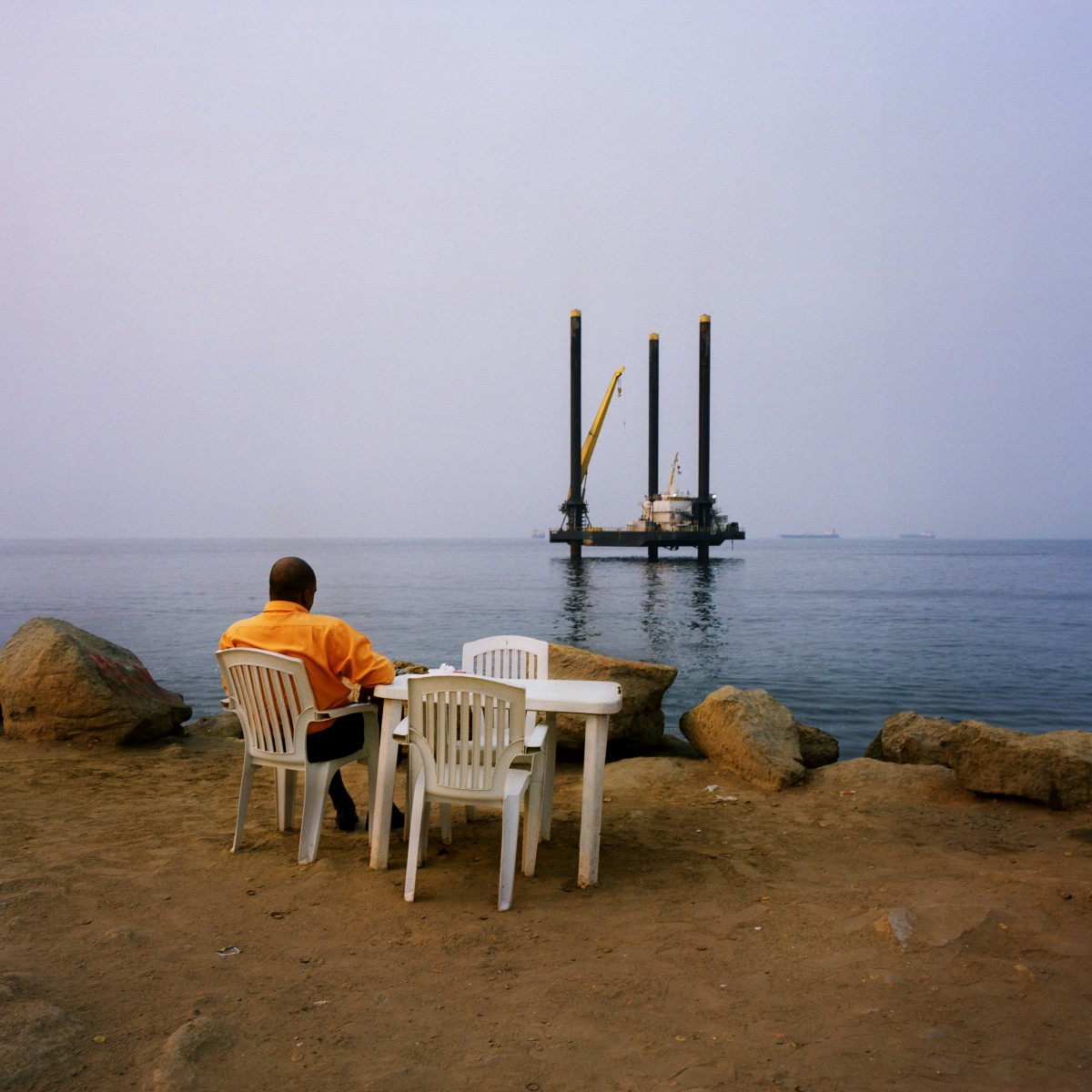
On Ilha de Cabo, an island off the coast of the Angolan capital Luanda.
© Alfredo D’Amato/Panos
Share post now
Article
21.06.2021, Trade and investments
Even with growing numbers of human rights abuses as evidenced by the cases of China and Myanmar, Switzerland lacks any legal basis for the rapid introduction of targeted economic measures.
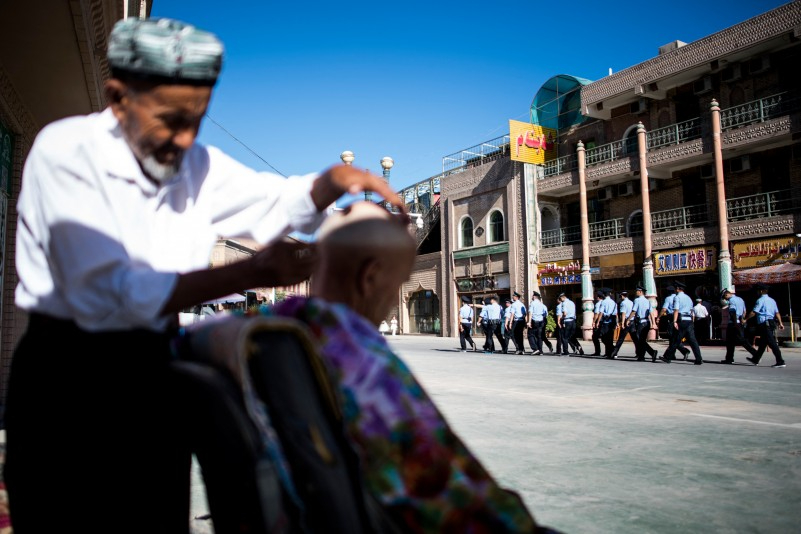
© Johannes Eisele / AFP
Share post now
Medienmitteilung
25.11.2021, Trade and investments
The WTO Ministerial Conference, to be held in Geneva from 30 November to 3 December, will discuss the temporary waiver of intellectual property protection on vaccines, tests and anti-covid drugs. We urge the Swiss government to stop its systematic blocking at the WTO, which has been going on for over a year. For their part, we also urge pharmaceutical companies to share their know-how without restriction.

© Tim Reckmann / pixelio.de
Share post now
Article
29.11.2021, Trade and investments
Despite the postponement of the WTO Ministerial Conference, Switzerland is finding itself increasingly isolated in its opposition to the waiver of patent protection on Covid vaccines. The WTO General Council could and should decide quickly.

WTO Headquarter in Geneva
© Isolda Agazzi
Share post now
Article
22.03.2022, Trade and investments
No sooner had the announcement on giving up fossil fuels been made, than Switzerland's Glencore International became the sole owner of Latin America's biggest open pit coal mine. It is even taking the Colombian State to court.
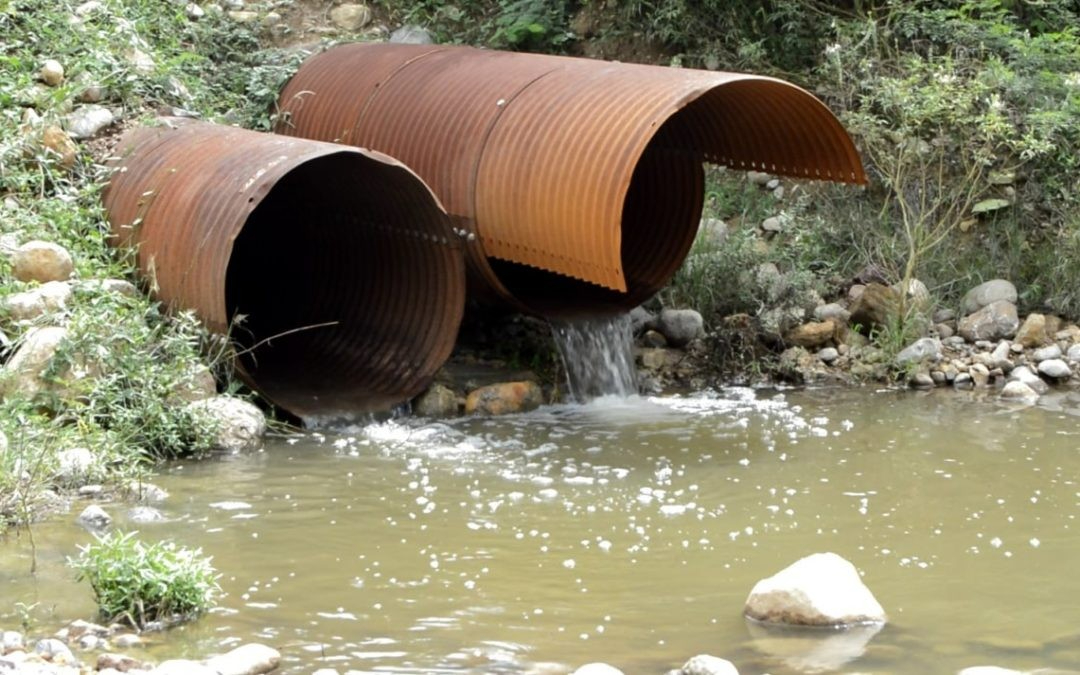
The Arroyo Bruno, a tributary of a major river in La Guajira, was diverted to intensify coal extraction at the La Puente quarry.
© Colectivo de Abogados José Alvear Restrepo (CAJAR)
On 11 January, Glencore – the world's biggest exporter of thermal coal – announced that it had acquired the stakes held by BHP and Anglo-American in "Carbones del Cerrejón", Latin America's biggest open-pit coal mine and one of the world's largest. The commodity trading multinational from Switzerland had struck a good bargain: thanks to higher demand and the corresponding high price of coal, Glencore was able to become the sole owner of "Carbones del Cerrejón" for just USD 101 million. The two other companies sold their stakes under pressure from their shareholders to give up the fossil fuels most harmful to the environment, for the sake of combating climate change. Glencore itself has no scruples in this regard, even though the company has committed to reducing its overall carbon footprint by 15 per cent by 2026, 50 per cent by 2035, and to becoming a zero-emissions concern by 2050.
"The Cerrejón coal mine has been operating for so many years now – mining began in 1985 – that the abuse of power and the asymmetry evident among the owners, the communities and the State have been amply documented. Severe human rights violations have been committed in particular against Afro-indigenous communities, mainly the Wayúu", says Rosa María Mateus of CAJAR, a Colombian lawyers' collective that has been championing human rights for the past 40 years.
"Carbones del Cerrejón has already been sanctioned in more than seven court cases", she continues. The penalties were never enforced, however, as the company benefits from the extreme poverty in these communities. La Guajira, where the mine is located, is Colombia's second most corrupt department. Children are dying of hunger and thirst, while the company takes advantage of the situation to offer compensation payments which the communities regard as a mockery. To address the climate crisis, which is hitting La Guajira's residents the hardest, we must change the economic model and get out of coal."
One of the aforementioned rulings concerns the Arroyo Bruno, a tributary of a major river in La Guajira and which was diverted to facilitate expanded mining operations at the La Puente quarry. This river is flanked by tropical dry forest, a highly threatened ecosystem. In 2017, the Colombian Constitutional Court held that the approval process for expanded coal mining had failed to consider substantial social and environmental impacts on the rights of local communities. One crucial consideration was that the region is plagued by acute water shortages and is especially vulnerable to climate change.
The Court ordered that work should be stopped and a new environmental impact assessment conducted so as to gauge the compatibility of expanded open-pit mining with the protection of the communities' rights. In retaliation, Glencore filed a suit against Colombia with the ICSID, the World Bank's arbitration body, invoking non-compliance of the investment protection agreement between Colombia and Switzerland. In its complaint, the multinational asserted that the decision by the Colombian court regarding the course of the Arroyo Bruno, which was hampering the expansion of the mine, was "unreasonable, incoherent and discriminatory". To date, one arbitrator has been appointed and no further information has transpired, not even about the compensation being sought by Glencore.
"It is outrageous that they are seeking compensation for the damage they themselves have caused", says an angry Rosa María Mateus. "The company claims to be following an environment-friendly policy and planting trees; as we have discovered, that is all a lie. It is not abiding by environmental standards and is not managing to repair even the barest minimum of the damage caused. We were able to verify the existence of water and air pollution and the negative impacts on the health of citizens. These are very serious breaches, especially in the light of discussions in Europe about decarbonisation and leaving coal in the ground".
So what can CAJAR do? Rosa María Mateus admits that they have limited room for action. The only option is known as an amicus curiae brief, which is a written submission through which the voice of communities can be heard; but it must be approved by the court. According to Mateus, the court nevertheless offers no guarantees for victims, as it is a kind of private justice system that was created to protect big companies.
"We will be attempting it all the same, and have just started compiling the arguments of the communities. Next, we plan to forward the amicus curiae brief to friendly organisations like Alliance Sud, so that they can help us publicise the situation. Companies command considerable media clout, and it is their own truths that get published, not the tragedies of victims. Glencore has been extracting raw materials on a large scale in Colombia, despite the very weak state of the country's economy. The company poses a threat to the sovereignty of the State and above all to the courts, whose jurisdiction it is calling into question – a practice that harks back to colonial times."
According to the United Nations Conference on Trade and Development (UNCTAD), Colombia is facing a flood of 17 lawsuits, a number that does not even include the latest one by Glencore. For the first time in 2016, the corporation had challenged a contract relating to the Prodeco coal mine and obtained USD 19 million in compensation payments. Such cases are adjudicated by a court comprising three arbitrators, of whom one is nominated by the foreign multinational corporation, one by the accused country and the third by both parties. The courts may admit amicus curiae briefs – for the most part written submissions generally laying out the viewpoints of the affected communities, and submitted by NGOs. So far, 85 amicus curiae applications have been filed, of which 56 have been admitted. The investment protection agreement on which the Glencore lawsuit is based does not provide for the possibility of an amicus curiae brief. The agreement is now being renegotiated and Alliance Sud is calling for the new agreement to provide for possibility of an amicus curiae brief, even though this is of no relevance to the pending proceedings.
Rosa María Mateus will be in Switzerland at the end of April / beginning of May to report on this case.

© Rosa María Mateus
"The children starve and die of thirst; the company takes advantage of the situation and offers compensation payments that are a mockery in the eyes of the communities."
Share post now
Press release
10.06.2022, Trade and investments
The WTO is heading for a major political failure in its response to the coronavirus pandemic. As its 12th Ministerial Conference opens the day after tomorrow in Geneva, member states are unable to agree on India and South Africa's request to suspend intellectual property rights on vaccines, tests and anti-covid drugs. Through its systematic blocking, Switzerland is at the forefront of this multilateral failure, which offers no coherent solution for equitable access to means of fighting health crises.
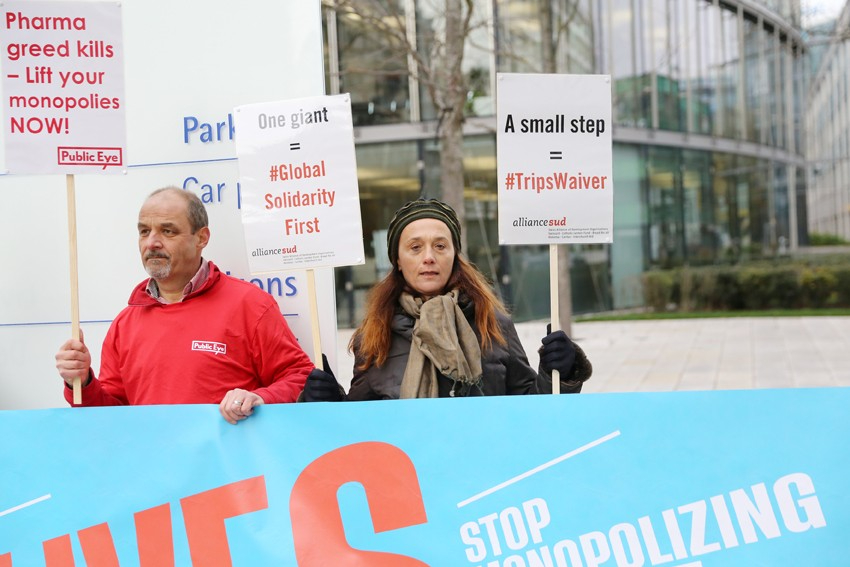
© Patrick Gilliéron Lopreno
Next week, the credibility of the WTO and its Director General Ngozi Okonjo-Iweala will be at stake in Geneva. Among the topics on the agenda of the 12th Ministerial Conference (MC12), which will be held from June 12 to 15, is the TRIPS waiver, named after the request for temporary suspension of intellectual property rights for the production and marketing of vaccines, tests and anti-covid drugs filed by India and South Africa in October 2020. This request was supported by a hundred countries as well as numerous international organizations and personalities, but the States hosting the large pharmaceutical companies, such as Switzerland, systematically blocked it.
If the MC12 Conference finally reaches an agreement, we will be very far from a generalized suspension of intellectual property rights, in view of the latest texts made public. The decision will at most be a reminder of existing instruments, such as compulsory licensing, which allows a State to authorize the marketing of generics despite the existence of a patent. However, other exclusive rights, such as trade secrets or the protection of registration data, are proven barriers to equitable access and technology transfer, which a compulsory license will not be able to overcome. Moreover, it will be necessary to proceed product by product, country by country, not to mention the diplomatic and commercial pressures that systematically accompany this type of approach. The only concession that could be considered a waiver is the possibility for an eligible country to re-export a vaccine produced under a compulsory license, but in a very limited way.
This text, presented as a "compromise" between the Members, is in fact imposed by the Western countries, including Switzerland. Unless there is a U-turn at MC12, it will not resolve the inequitable distribution of resources in the fight against Covid-19. First, it only covers vaccines, while access to treatments and diagnostic tests is equally inequitable due to the exclusive rights held by Pfizer, Roche and others. Secondly, it excludes many countries from the possibility of using it for commercial or geopolitical reasons, whereas WTO rules are supposed to apply everywhere, without discrimination. Finally, it creates new obstacles for eligible countries to use this mechanism, setting a dangerous precedent that will also hamper the response to future pandemics.
Such an agreement is unworthy of Western countries like Switzerland that claim to respect human rights, including the right to health. As the host country of the MC12, and as the chair of the WTO's highest decision-making body since last March, Switzerland had the necessary leverage to positively influence the final outcome. Even though it is (over)supplied with vaccines, treatments and tests, it preferred to favour the interests of the pharmaceutical companies, which will thus be able to continue to decide who receives how much, when and at what price. Covid-19 showed that the WTO did not have adequate rules to respond effectively to a global health crisis, and it did nothing to put them in place for eighteen long months.
Informations:
Isolda Agazzi, Alliance Sud, Trade policy expert, isolda.agazzi@alliancesud.ch, +41 21 612 00 97
Patrick Durisch, Health policy expert, Public Eye, patrick.durisch@publiceye.ch, +41 21 620 03 06
Share post now
Article, Global
21.06.2022, Trade and investments
The sanctions against Russia are deemed the only possible non-military way of bringing about an end to the war. Yet they raise many questions. What is their purpose? And how effective are they?
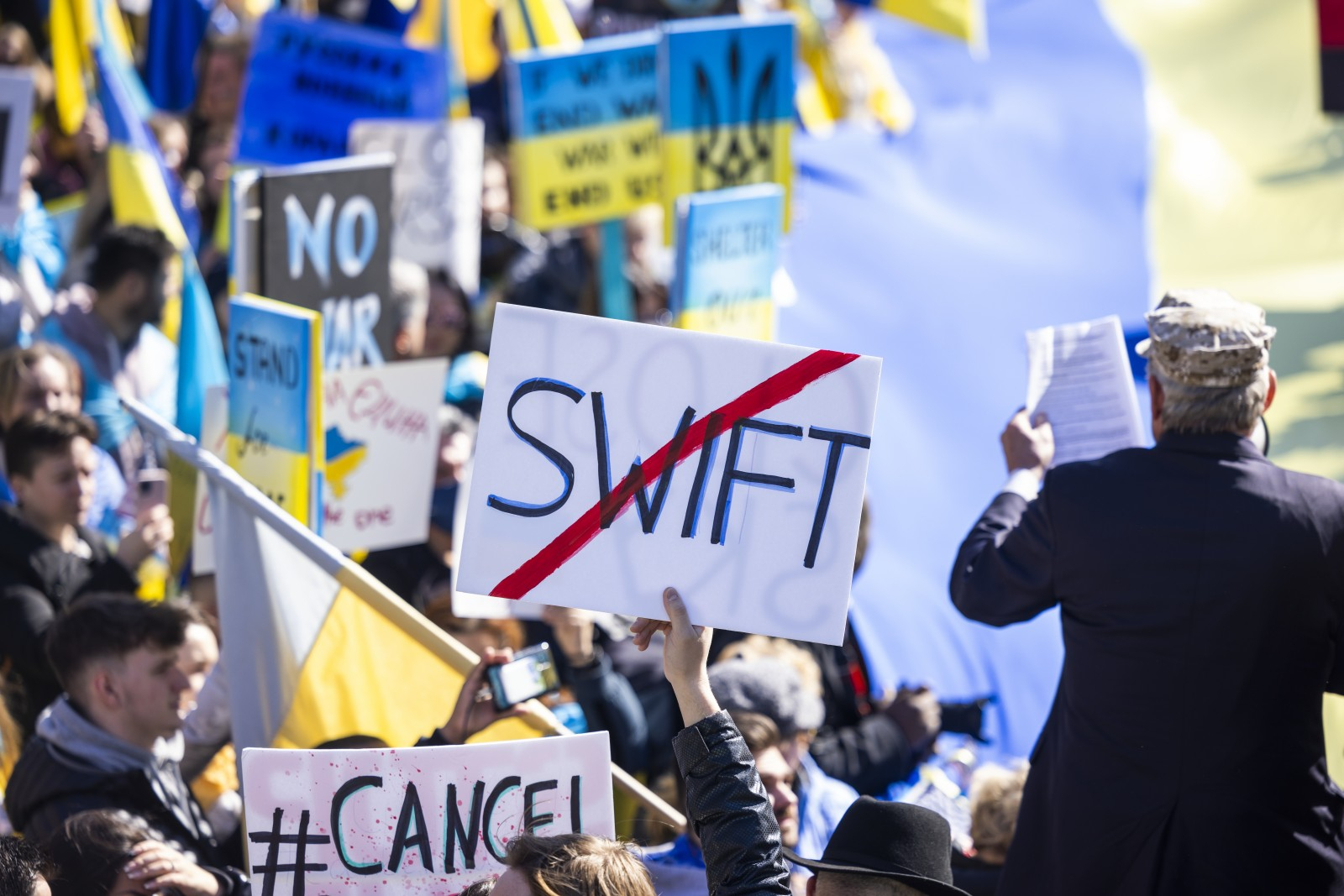
Ukrainians in the US demonstrate in front of the White House demanding sanctions shortly after the Russian invasion began.
© Foto: JIM LO SCALZO / EPA / Keystone
After Russia invaded Ukraine on 24 February, Western countries imposed sanctions unprecedented in scale on the Kremlin and its political and economic leadership. Thirty-five Western countries supported them, but not a single developing country took part. Switzerland, which over the past 20 years has supported EU sanctions in almost half the cases, also got behind them eventually, owing to growing international and domestic pressure.
It is the first time that sanctions have been imposed even against the central bank of a G20 country, and yet it is difficult at this stage to assess whether or not they will work. But what does “work” mean? What are they meant to achieve? And what impacts are they having (in particular) on the Russian people?
“Sanctions pursue a series of overlapping goals, and even the countries that impose them do not always know precisely what goal is being pursued”, says Dmitry Grozoubinski, Executive Director of the Geneva Trade Platform. “As pertains to Russia, there are four goals: regime change, change of Russian policy, financially choking off the military establishment, and expressing Western repudiation.”
The former Australian diplomat stresses that the first goal has never been achieved in this manner. Sanctions have never been able to force regime change, except perhaps in the case of South Africa during apartheid. “The Russian people are accustomed to tightening their belts, especially when they feel attacked by foreign powers”, he says. “The financial sanctions affect chiefly the young and educated, and also city dwellers. Many of them are leaving the country even though they are the ones best placed to bring about regime change.”
As pertains to a change of policy, both Grozoubinski and Erica Moret, Coordinator of the Geneva International Sanctions Network, take the view that this is difficult to achieve: while Russia can clearly not ignore the sanctions, it is hard to tell whether they are a decisive factor for or against the continuation of the war, the start of diplomatic negotiations, the use of chemical weapons or the bombing of a school or a hospital.
On the other hand, Dmitry Grozoubinski notes that they have proved an effective means of choking off Russia’s military resources. Some experts believe that the sanctions imposed on Moscow following the annexation of Crimea in 2014 are the reason for Russia’s glaring lack of leading-edge military technology: the arms industry is unable to source the necessary components, especially semiconductors, on Western markets, and it is unlikely that China and India will be able to fill these gaps.
As regards the symbolism of the sanctions, experts point to the fact that the industrialized countries must be prepared to pay the price of their repudiation – this is already happening, despite their unwillingness, at least so far, to forego gas supplies altogether.
The impacts on the Russian people are catastrophic. For example, this led the Russian Professor Maxim Mironow of the IE Business School in Spain to tweet: “The Russian economy is on its knees”. In his view, the citizens will be especially hard hit by the collapse and the slowdown of the processing industry, as it will no longer be possible to import Western components and machinery. This applies to all sectors – 90 per cent of the seeds for Russian potatoes are imported, for example.
“One of the trade-related challenges is that an international transaction does not consist only of purchase and sale: it needs insurers, financial institutions, transport companies – and most of them have ceased their activities for fear of loss-making operations or boycotts,” Dmitry Grozoubinski adds. “Many pharmaceutical producers are still selling to Russia, but what will they do when there are no more ships, as none is prepared to take uninsured cargo on board? And if the banks are excluded from the Swift system, traders based in Geneva will face unsurmountable problems.”
Erica Moret adds: “The sanctions are becoming less and less targeted. Around the year 2000, following the humanitarian crises in Cuba, Haiti, Iraq and elsewhere, the United Nations and various governments, including the USA, attempted to impose targeted sanctions – such as freezing the assets of several persons or companies, travel restrictions or a ban on the purchase or sale of weapons. The past 20 years, however, have witnessed the growing use of blanket sanctions, which are de facto sanctions on entire sectors, such as the finance or the energy industry. On paper they may well remain targeted, but in practice they are akin to an embargo against a country. Iran, North Korea, Syria and Venezuela are cases in point. Besides, studies have shown that sanctions imposed on the central bank or the energy industry have considerable humanitarian impacts, as they tend to drive up inflation and joblessness.”
According to the scientist, it is, however, extremely difficult to gauge the impact of sanctions, taken in isolation from other factors: correlation is not synonymous with cause. In the cases of Sudan, Venezuela and Myanmar, the disastrous humanitarian situation is attributable not only to the sanctions, but also to government oppression, corruption, bad governance and human rights violations. “It is important to underline this, as the topic is much politicized. In their argumentation, governments invariably blame all problems on sanctions, even though there are also other factors at play.”
Erica Moret points out that, besides the broadening of sanctions, the introduction of further anti-corruption and anti-money laundering rules binding on the private sector and banks can further complicate the picture. The fear of having to pay billions in penalties can lead to overcompliance, so that banks prefer to withdraw altogether from countries like Syria or Iran. “Overcompliance and de-risking often have greater consequences than sanctions, as even the toughest sanctions provide for exceptions, which theoretically permit the trade in medicines, food, and the like. Overcompliance, in contrast, affects the entire supply chain, insurers, transport, the technology sector…”
Erica Moret considers it still too early to assess the repercussions of this phenomenon on Russia, but what is certain is that the boycott by multinational corporations is bound up both with the sanctions and considerations of reputation and corporate responsibility. In terms of symbolism, this plays a key role, as it demonstrates to the Russian people that most Western companies are against the war; this also gives greater prominence to the message from the “international community”. One danger inherent in broad sanctions, however, is that they could further bolster popular support for the government, especially in countries where the media are controlled. The disappearance of luxury items from the market may as yet have no humanitarian implications; the departure of pharmaceutical, food and technology companies, however, may well do.
On 25 March 2022, eight UN experts – including the Special Rapporteur for the Right to Food, Health and Clean Drinking Water – urged States to consider humanitarian impacts when imposing or implementing sanctions.
They wrote: “Unilateral sanctions that target fiscal systems, including remittances as well as other international financial transactions and that are related to the basic needs of a population, are against the underpinning principle of human rights of ‘raising living standards’ and are actions that lower living standards, and take States backwards on their SDG commitments. They are unacceptable. […] Banks and businesses must not prevent nor be prevented from trade and delivery of food, water, medical equipment, life-saving drugs and vaccines, spare parts, equipment or reagents necessary for the maintenance of critical infrastructure, in the spirit of due diligence and corporate responsibility to protect human rights.”
According to Erica Moret, sanctions are just one among many instruments, alongside diplomacy and good offices. They are more effective against a country which, like Russia, is well integrated into the global economy, than against one that is already isolated. Alliance Sud strongly urges Switzerland and the international community to ensure that sanctions have no disproportionate and unnecessary impacts on citizens.
Share post now

global
The Alliance Sud magazine analyses and comments on Switzerland's foreign and development policies. "global" is published four times a year (in german and french) and can be subscribed to free of charge.